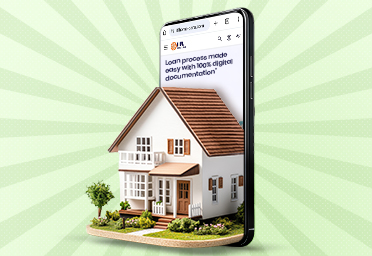Why Buying a House in Your 20s is a Smart Financial Move

As people say the 20s are the most indispensable decade of your valuable life. Some of you take your career to a new level; some of you plan to get married. Wait ait have you decided to invest in a property Property purchase at an early age is highly rewarding in the long run. We will start the discussion with a case study.
In 2003, Builders at Dum Dum cantonment in Kolkata were selling 534 Sq. Ft. area flat at Rs 2, 34,000/- The average price was around Rs 445/Sq. Ft. In 2017 i.e. after 14 years, the same used flat is costing Rs 2600/Sq. Ft. making its price around Rs 13, 90,000/- The value of the property has increased more than 500% in these years. Some of those who purchased the property in Dum Dum Cantonment at that time have already paid off the home loans and are satisfied with the asset creation. The construction work for a metro rail station is going near the Dum Dum cantonment railway station. This is likely to increase the property prices at a more rapid pace in this area.
The above example shows there is a high Return on Investment ROI on real estate investment. And what would be better than investing in real estate at the early 20s Thanks to the compounding power of time. With the passage of years, the value of the asset increases manifolds. When you purchase a home, you get zaadi from rent.
Rent VS EMI
Let say there are two people, A and B. A pays a rent for a property worth Rs 70,00,000. Whereas B has availed a home loan of Rs 50,00,000 for the same property. Let see who is in a better position after 15 years
A started paying house rent of Rs 2, 16,000 p.a. 18,000 per month. The rent increases at the rate of 10% p.a. so the rent becomes Rs 2, 37,000 the next year. Likewise, the rent increases at the same rate per annum.
B is paying Rs 6, 000, 00 50,000 per month as EMI on an annual basis. EMI is equal monthly installments paid on monthly basis the EMI remains same for next say 15 years. After 11 years, the rent exceeds the fixed EMI i.e. breakeven point as evident in the screenshot. After 15 years, B becomes the owner of the property but person a still remains to pay the rent for the property.
Conclusion - If you are in a stable job and have a fund for down payment, invest on a property with home loans. It is a well-known fact with increased age comes increased responsibility. In 30s people get married and have kids. They face new financial realities and challenges into other aspects of their life. The 20s is the time when one is not tied up with many responsibilities. Yes, it is a fact that owing to little life experience and limited money, one faces challenges for buying a property. So, it is better to ask those who have experience in investing at an early age.
The fallen interest rates, Government constructive initiative towards ousing for all by 2022 abolition of Foreign Investment Promotion Board FIPB, approval of one clearance window for foreign direct investment, allocation of more funds for Pradhan Mantri Awas Yojana PMAY all make this the right time to invest in real estate market.
Tags
Disclaimer: The information contained in this post is for general information purposes only. IIFL Home Finance Limited (including its associates and affiliates) ("the Company") assumes no liability or responsibility for any errors or omissions in the contents of this post and under no circumstances shall the Company be liable for any damage, loss, injury or disappointment, etc. suffered by any reader. All information in this post is provided "as is", with no guarantee of completeness, accuracy, timeliness, or of the results, etc. obtained from the use of this information, and without warranty of any kind, express or implied, including, but not limited to warranties of performance, merchantability, and fitness for a particular purpose. Given the changing nature of laws, rules, and regulations, there may be delays, omissions, or inaccuracies in the information contained in this post. The information on this post is provided with the understanding that the Company is not herein engaged in rendering legal, accounting, tax, or other professional advice and services. As such, it should not be used as a substitute for consultation with professional accounting, tax, legal or other competent advisers. This post may contain views and opinions which are those of the authors and do not necessarily reflect the official policy or position of any other agency or organization. This post may also contain links to external websites that are not provided or maintained by or in any way affiliated with the Company and the Company does not guarantee the accuracy, relevance, timeliness, or completeness of any information on these external websites. Any/ all (Home/ Loan Against Property/ Secured Business Loan/ Balance Transfer/ Home Improvement Loan/ NRI Home Loan/ Home Loan for Uniformed Services) loan product specifications and information that may be stated in this post are subject to change from time to time, readers are advised to reach out to the Company for current specifications of the said (Home/ Loan Against Property/ Secured Business Loan/ Balance Transfer/ Home Improvement Loan/ NRI Home Loan/ Home Loan for Uniformed Services) loan.
 Login
Login






















